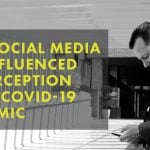As of right now, I am sure that there isn’t a single person who doesn’t know about the novel coronavirus, and that it can be killed only with water and soap. We all know the symptoms of the illness, the number of cases in our countries, why it’s important to stay home and why we are all practicing social distancing.
This is the power of social media. The ability to share information at a level the world has never seen before. And while this is amazing in so many ways, the fact that ANYONE can create content on social media could be a red flag. That’s why we need to take content from unverified sources with a pinch of salt.
Let’s take a look at how social media has been influencing our perception of the pandemic.
THE GOOD
Information
We all now know that by washing our hands and staying at home we can beat the spread of this infection. This message is constantly reiterated to us and a lot of people are actually following this advice. Through social media we also stay abreast of world developments related to the pandemic.
Inspiration
Even as we all move to working and almost living digitally, social platforms have given us a great way to stay connected with each other and share some inspiring ideas. Doing the rounds now are recipes, home fitness inspiration, encouragement, education and humour – all of which are helping to make the pandemic a little more bearable. Some examples are Tik Tok dances and Joe Wicks home exercises. Importantly, we also find solidarity and support from family, friends and even strangers online!
THE BAD
Misleading Content
Not all information is ranked the same. There is a lot of false news that is doing the rounds, and social platforms are banning and blocking this content. For example, about a weeks ago my feed was littered with claims saying the novel coronavirus infection was airborne – this is simply not true. It can only spread through contact with infected surfaces and people. This fake alert caused a lot of panic, and governments had to step up to say this information is not true.
Be wary of any ‘medical information’, conspiracy theories and unverified updates – take them with a pinch of salt and make sure to report abuse if you see anything wrong being shared online.
Fear mongering
There are some businesses that are trying to take advantage of the situation to run ads for masks, sanitisers and so on. These things are in shortage in places they are needed the most and Facebook, Instagram and Twitter are actually banning these ads. There’s also other content that preys on our insecurities, and heightens them with sensationalism. Self-censor your media use and try to maintain a positive frame of mind.
Let’s be responsible with the way we use social media. It can be a force for good – let’s make this happen for the sake of our communities, countries and the world.






